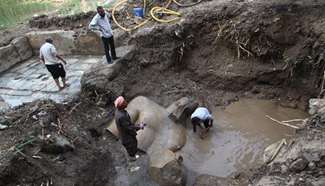WASHINGTON, March 10 (Xinhua) -- Middle-aged people who feel dizziness on standing up due to a temporary drop in blood pressure may be at an increased risk of developing cognitive decline and dementia later in life, U.S. researchers said Friday.
These temporary episodes -- known as orthostatic hypotension -- may cause lasting damage, possibly because they reduce needed blood flow to the brain, according to researchers at the Johns Hopkins Bloomberg School of Public Health.
The researchers analyzed data from more than 11,000 people, who were on average 54 years old upon enrolling in a study on the risk of atherosclerosis in four U.S. communities.
Orthostatic hypotension was defined as a drop of 20 mmHg or more in systolic blood pressure or 10 mmHg or more in diastolic blood pressure.
Roughly six percent of participants, or 703 people, met the definition at the start of the study.
These participants were then followed for 20 or more years and those with orthostatic hypotension at the first visit were found to be 40 percent more likely to develop dementia than those who did not have it.
The study also found people with orthostatic hypotension had 15 percent more cognitive decline.
"Even though these episodes (orthostatic hypotension) are fleeting, they may have impacts that are long lasting," study leader Andreea Rawlings, a post-doctoral researcher in the Department of Epidemiology at the Bloomberg School, explained in a statement.
"It's a significant finding and we need to better understand just what is happening."
Rawlings said it is not known if orthostatic hypotension was an indicator of some other underlying disease or whether the drop in blood pressure itself is the cause.
"Identifying risk factors for cognitive decline and dementia is important for understanding disease progression, and being able to identify those most at risk gives us possible strategies for prevention and intervention," Rawlings said. "This is one of those factors worth more investigation."
The findings were presented at an American Heart Association meeting in the U.S. city of Portland.












